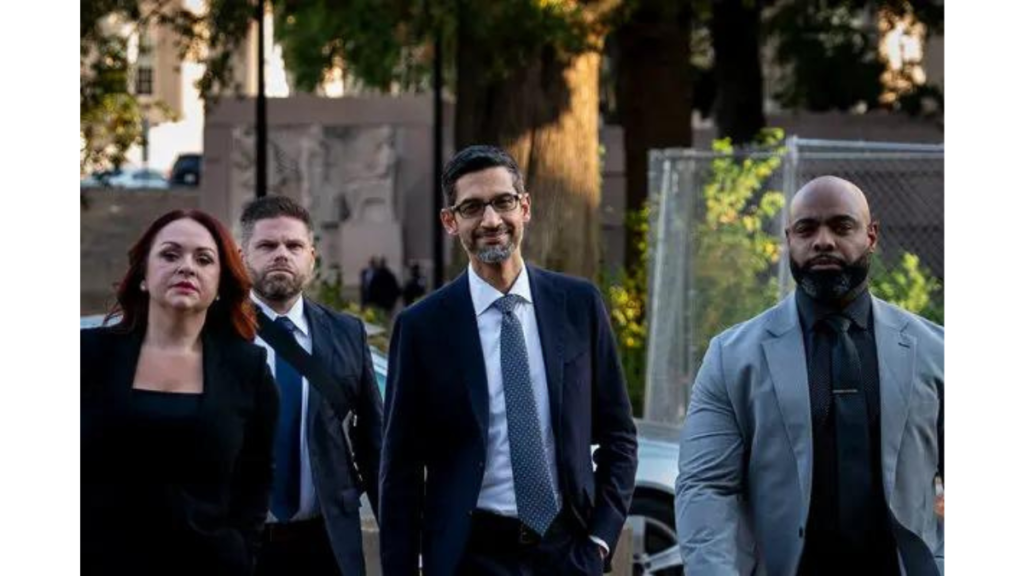A historic antitrust trial was attended by Google’s Chief Executive Officer, Sundar Pichai, who testified about the company’s business practices. The prosecution’s position in this case is that Google unlawfully maintains a monopoly on the market for search engines, and they are trying to prove it. Pichai said that Google had made compromises in order to please Apple during the eighth week of discussions for a huge contract worth multiple billions of dollars with Apple. The negotiations had been going on for eight weeks. Pichai insisted that Google had acted in this manner to satisfy Apple’s demands and concerns. According to the claims that have been made by the Department of Justice, Google forces device manufacturers to comply with its regulations by insisting that they use Google as their primary search engine in order for them to be eligible for a portion of the money generated by search ads. This is a requirement for the device manufacturers to be eligible for a portion of the revenue generated by search ads.
Thursday marked the beginning of Google’s defense, and Pichai was the third witness the firm sent in to testify in its favor. The United States federal government and a group of state attorneys general accused Google of violating antitrust laws by accusing the company of abusing its dominant position in the search and search advertising industries. This study lasted for a total of six weeks and took place over the course of that same amount of time. The U.S. Department of Justice believes that Google has illegally maintained a search monopoly by paying tens of billions of dollars annually to have its search engine set as the default on iPhones and other electronic devices. The DOJ bases this assertion on the fact that Google has paid to have its search engine set as the default on iPhones and other electronic devices. On the vast majority of contemporary electronic devices, the default search engine can be found. The prosecution argues that customers have been damaged since there has been a decrease in product diversity, a decline in product quality, and an increase in the amount of money spent on marketing.
Included in Google’s “Traffic acquisition costs,” an area of spending that the company disclosed it incurred $26.3 billion for in 2021, are payments that the company makes to firms like Apple for search defaults. Before the trial, Google and its partners had never before discussed business deals of this nature in a public arena. Google claims that the key reason for the company’s dominance in the market for search engines is the high quality of the items that it offers in that market. It is anticipated that a decision will be handed down by Judge Amit P. Mehta in 2019.
Pichai discussed his boyhood in Chennai, which is located in India, as well as his involvement in supervising the creation of Google’s Chrome browser, which is today the web browser that is used the most frequently all over the world. Chrome is currently the most extensively used web browser. An email that was written by Pichai to colleagues in 2007 and submitted as part of the evidence that was shown in court included a request for the recipients to grant Apple permission to simplify the process of switching from using Google to using Yahoo search on Apple’s Safari web browser. Despite the fact that Google insisted on default status as part of their revenue-sharing pact, this proposal was still made. Pichai voiced his unhappiness with the practice and his concern over the “optics” of Google being the only search engine available in the browser in an open letter that he published online. The remark made by Pichai was posted on the website Medium.
Emails that were exchanged from within Google and shown in court reveal that management took efforts to avoid being a target of antitrust by limiting the use of phrases like “market share” in company records. This information was presented in court. This was done to prevent Google from being the focus of any potential attacks. According to Gary Reback, an experienced antitrust attorney who is observing the trial but is not representing any party in the case, the Justice Department placed a large degree of confidence on Google’s own emails and other evidence in its investigation. Reback is monitoring the trial but is not representing any party in the case. After hearing trial testimony from Google officials who differed with the reading of the files provided by the Justice Department, it is unclear which account of the facts Mehta will find to be more credible. After hearing this testimony, the trial has been adjourned.
Because this is the first time that the Justice Department has taken a computer company to court on antitrust grounds since Microsoft in 1998, the whole computer industry is keeping a close eye on the trial.
Read More : rubblemagazine.com







